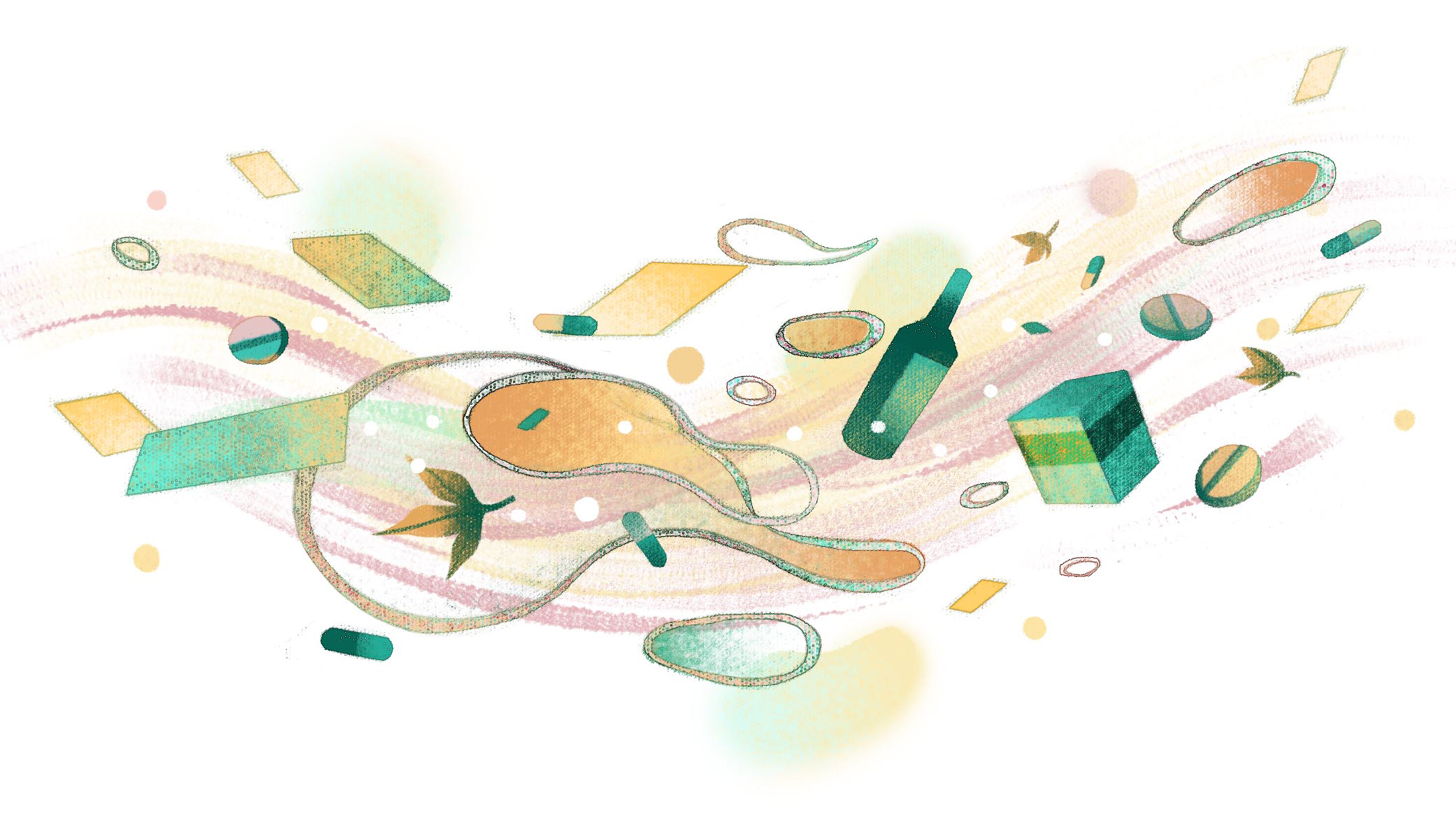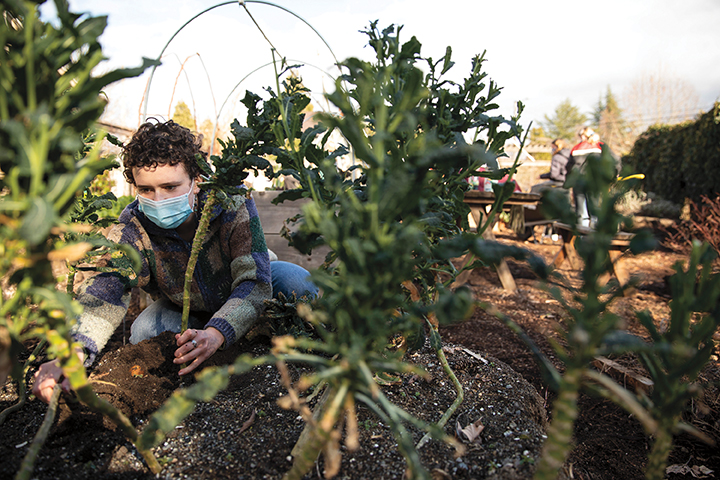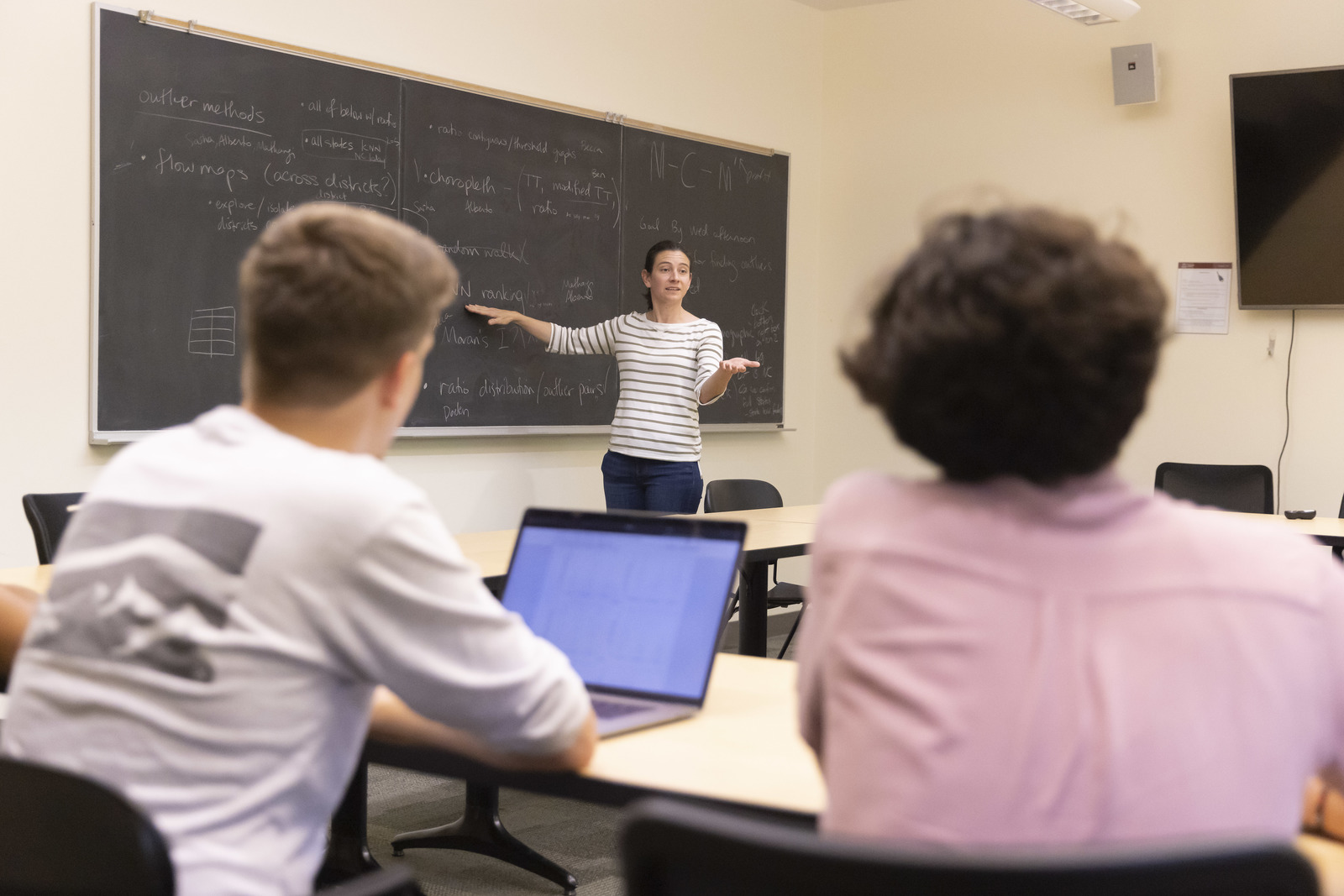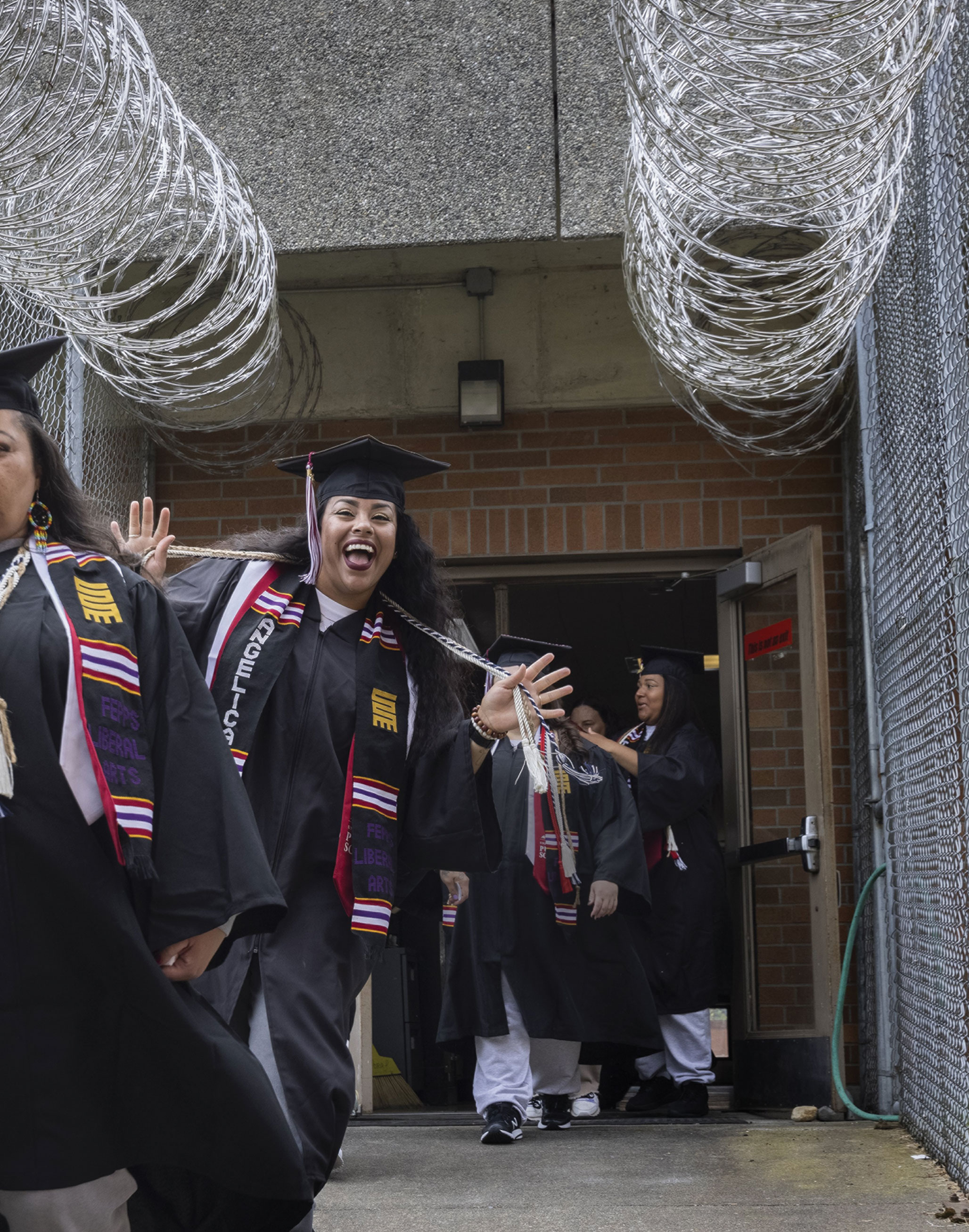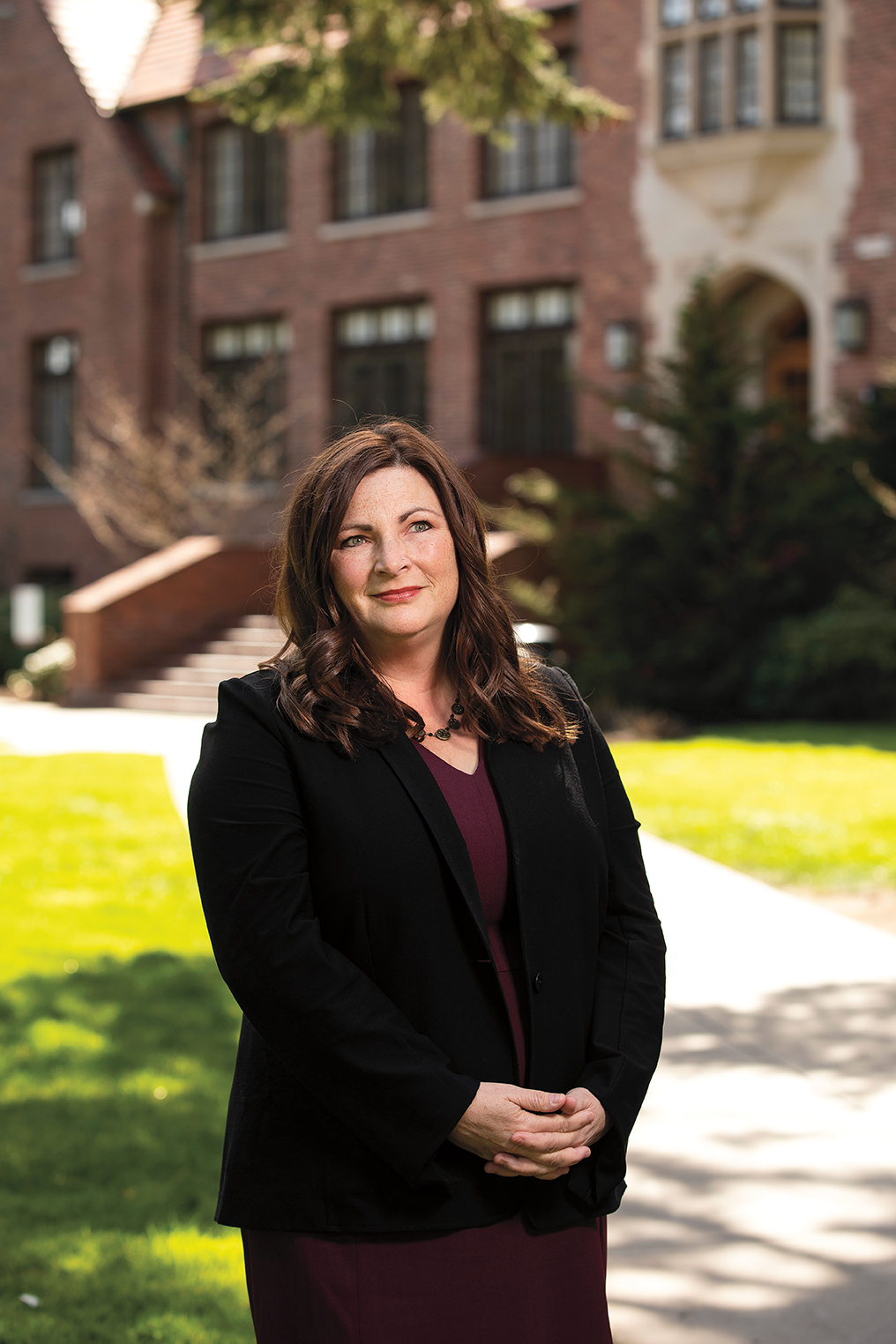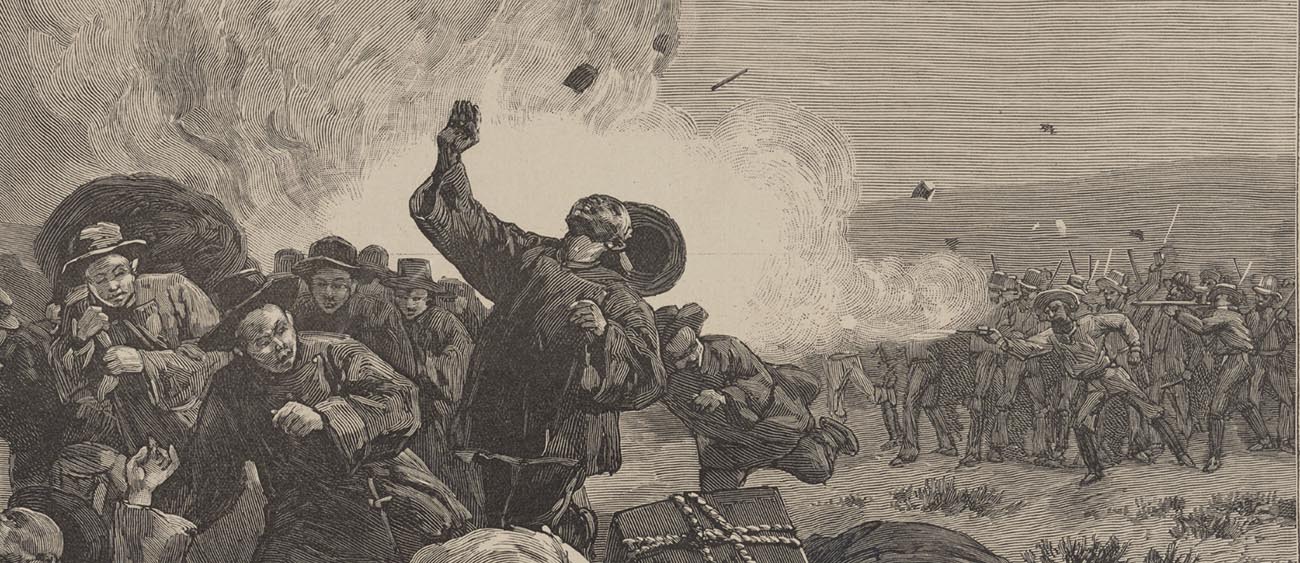We asked seven faculty members who are retiring this spring to reflect on their Puget Sound careers—and tell us what’s next.
WHAT WAS YOUR FAVORITE COURSE TO TEACH?
I’ve loved teaching the senior-level quantum mechanics course. At this stage of the game, students have enough math skills and physics background to delve deeply into the subject—it’s pretty exciting for them and for me as well. It all starts to come together. I learn more every time I teach the course.
- Greg Elliott, professor of physics, retiring after 30 years at Puget Sound

studies
I was very interested in film studies as an undergraduate and in my early graduate career. While working on my Ph.D., I concentrated on legal and political rhetoric. Most of my research and teaching focused on what I call “constitutional discourse.” I dabbled in film studies over the years, and this semester I taught a 400-level media studies course on “politics and film.” My students and I analyzed how films about politics work as film narratives and how those narratives convey messages about American politics. I’ve been able to integrate my first passion with my career-long focus on politics and political rhetoric.
- Jim Jasinski, professor of communication studies, retiring after 26 years on the faculty
My favorite course to teach was… [insert a course you took with me here]. Seriously, it’s impossible to name a favorite course. I am lucky to have been asked to teach classes that always felt important. There are classes I wish I’d been able to teach— but that’s an answer to a different question.
- Terry Beck, distinguished professor, School of Education, retiring after 24 years
Organic chemistry is a notoriously difficult class and I expected that the students would resent it. What I didn’t realize was the power of expectations and how they can be used to good advantage. The students come in prepared to put in their best effort to succeed—they don’t expect O-Chem to be their “easy A.” This is a remarkably powerful gift for a teacher! I’ve had jealous colleagues marvel at the amount of work students are willing to put into their O-Chem course. But just because they’re primed to work hard doesn’t guarantee that the students will immediately succeed. All of a sudden they encounter something that requires real effort to master, and they don’t know how to respond when their usual study strategies (or lack thereof) fail to produce the desired result. This is something else I didn’t realize when I started teaching: Being a teacher is more than simply clearly conveying information; it involves working with students to encourage them, giving them the tools they need to succeed, and inspiring them to rise to the challenge. The amazing thing is that the majority of students eventually figure it out, are transformed by the experience, and feel a real sense of pride and accomplishment. There are few things more rewarding than seeing a student make that transition, and that happens more in organic than in any other course I’ve taught.
- John Hanson, professor of chemistry, retiring after 33 years at Puget Sound

Through interdisciplinary teaching I’ve had the joy of teaching with more than 20 different colleagues. Some of the memorable interdisciplinary courses have been Salmon Recovery in the Columbia River, which provided a conceptual chrysalis from which Environmental Policy and Decision Making eventually emerged; Hooch: The Natural and Social Science of Liquor, a class modeling how to pursue one’s interests and passions post-graduation (and we didn’t mean drinking); Conservation and Biodiversity in Borneo, a travel course that I initially taught through PacRim and then as a Luce-funded field school; and the intro EPDM course where we used Puget Sound watersheds and salmon as a case study to ground students in politics, ethics, culture, history, and science. But probably my favorite course to teach over the long term has been Biology 112. It allowed us to get into the field, learn natural history, and consider the explanatory power of evolution as a lens to think about all things living.
- Peter Wimberger, retiring after 30 years as professor of biology
WHAT ADVICE DO YOU ALWAYS GIVE TO GRADUATING SENIORS?
I always tell students to get rich, to become billionaires quickly—so they can have a midlife crisis as early as possible and begin to question more profoundly how they want to live, how they will spend the limited time they have here on the planet. Some of us totally identify with our jobs; we live to work, and have lost touch with the reality that we work in order to live. It’s a confusion of means and ends. I always hope that our students will find thinking partners and continue to ponder what “the good life” might be—beyond our occupations!
- Stuart Smithers, professor of religion, spirituality, and society, retiring after 34 years
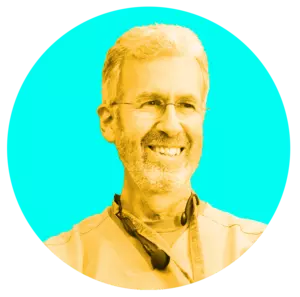
WHAT’S YOUR GREATEST JOY IN TEACHING?
I remember reading in my job description that I was supposed to be an excellent teacher and to demonstrate that I was constantly growing professionally. They wanted to pay me to learn as much as I could and to hone my craft as a teacher. Wow! For me, it doesn’t get better than that.
- Terry Beck
The good fortune to work with and learn from Doctor of Physical Therapy students who brought to our program and profession so much talent, inquisitiveness, and altruism. Sharing with them and exploring moments when one of their insights ignites a novel perspective on an existing area of thought is simply an unparalleled delight.
- Roger Allen, distinguished professor of physical therapy, retiring after 25 years on the faculty
Getting to work with Puget Sound’s amazing students was what kept me getting up in the morning for over 30 years. Their energy helps buoy my spirits and gives me faith for the future—even though our world faces many challenging problems. There were times when I was asked to consider moving out of teaching and into the dean’s office. And while those are important positions, I realized that I couldn’t bear to give up my daily interactions with students.
- John Hanson
WHAT DO YOU FEEL PROUDEST ABOUT IN YOUR PUGET SOUND CAREER?
Playing a part in helping students figure out their passion. For some, that involved pursuing graduate work in rhetoric and communication. I really enjoy having a drink at conferences and catching up with former students who are now my professional colleagues. Other students discovered or perhaps confirmed their interest in the law in some of my courses. I’ll occasionally receive an email from a former student who simply wanted to let me know that something happened to them—usually at work—that made them think about something we discussed in one of their classes. Those emails are very gratifying.
- Jim Jasinski

chemistry
Two things come to mind. First, I’m proud of my role in launching the education studies minor. Second, being a good teacher. I was honored with the President’s Excellence in Teaching Award in 2018. When the president was describing the award recipient, I was stunned into silence when I realized he was talking about me—I couldn’t believe it. I teach with so many amazing faculty. To be honored in this way is something I will always treasure.
- Terry Beck
I feel privileged and humbled to have helped set a foundation for what my students have gone on to do with their careers. I’ve had around 900 DPT students learn their clinical anatomy, neuroanatomy, and understanding of human pain with me. Each of them came here with the goal of developing the knowledge and skills to help people restore lost function and ease human suffering. Over the years, I’ve learned a tremendous amount from hearing about our graduates’ therapeutic directions, the people they’ve helped, the innovations they’ve developed, and their depth of compassion. It’s staggering to think about how many lives they have collectively touched. Genuinely illuminates the reality of “making a difference.”
- Roger Allen
Receiving the Dean’s Teaching Award (1999) and the President’s Excellence in Teaching Award (2012) were certainly highlights. I also had several very rewarding experiences in university service, including serving as a faculty representative on the selection committee that brought President Thomas to campus.
- John Hanson
We succeeded in increasing the visibility and reach of the natural history museum from about 100 people per year to more than 15,000 per year before COVID. The docent program now serves more than 40 students who plan and execute outreach activities, learn museum practices, and gain a deeper understanding of the utility of natural history collections for research and teaching. Mentoring research students has been amazing and led to my deepest and longest-lasting connections with students. And then there’s sharing the joys of stair sliding with over 20 years of graduating seniors in biology.
- Peter Wimberger
HOW HAS THE CLASSROOM CHANGED WITH THE ADVENT OF SMARTPHONES AND LAPTOPS?
These days I routinely start each class with, “It’s time to put your devices away.” And sometimes I have to follow up by pointing out to a student that their device is still out. Pre-pandemic, this was a much smaller issue.
- Terry Beck
Let’s just say that I’ve been here so long that my email address doesn’t have a first-name initial (I’m just hanson@ pugetsound.edu), and I was one of the first faculty on campus to create websites for my courses.
- John Hanson
DID YOU MAKE A PIVOT DURING COVID THAT YOU'RE ESPECIALLY PROUD OF?
Pre-COVID, I didn’t use a lot of technology such as PowerPoint in my classes. I relied on handouts and white boards. I realized very quickly that I needed a strong visual component if I was going to make a successful transition to online teaching. I would not say that I’ve developed expertise in creating PowerPoint presentations, but I think I’ve become competent and done a decent job incorporating PowerPoint in my in-person classes. Jim Jasinski Ha! I learned to do remote teaching, but I never liked it. Building relationships and knowing what was happening in the class was much more difficult when we were in different places. The best pivot I made during COVID was returning to face-to-face instruction, even when it required wearing a mask.
- Jim Jasinski

Ha! I learned to do remote teaching, but I never liked it. Building relationships and knowing what was happening in the class was much more difficult when we were in different places. The best pivot I made during COVID was returning to face-to-face instruction, even when it required wearing a mask.
- Terry Beck
Our frantic adaptations to implement remote teaching kept our learning environment viable during the days of isolation. This helped our students stay on course, but it significantly changed my perspective on a critical element of in-person learning. Our DPT program is a tough ticket: three years of a very steep learning curve, with lots at stake for the students, and a quite stressful preparation for a career. Some of their most salient coping and support mechanisms come from being able to share the grind with each other. The biggest compromise our students experienced during COVID was social isolation from faculty and peers. While many students formed small study groups, others were isolated alone at home in front of their computer screens. I later realized I had completely underestimated the impact this had on many of our folks. Back when it was business as usual, I had never been sufficiently aware of the community’s role in providing social, academic, and emotional support. Our students toughed it out with extraordinary grace, but the absence of physical community definitely took its toll. I hope we never take that lesson for granted.
- Roger Allen
WHAT WAS YOUR BIGGEST CHALLENGE OR REGRET?
I devote significant time in my classes to help students develop as writers. Perhaps the biggest challenge in that context is getting a student to understand that a really good sentence that they buried in the middle of a long, rambling paragraph needs to become the focus of one or two paragraphs that develop the idea. Students in their first year or two have a difficult time grasping this idea.
- Jim Jasinski
I wish I had done more team teaching. I had two intellectually vibrant experiences team teaching over the years. I wish I had more. I developed and team taught CHEM 115 (a first-year chemistry course) with Steven Neshyba, and developed and team-taught an upper level chemical biology course with Bryan Thines. Teaching these courses felt like those transcendent performances where you see two accomplished musicians, who don’t normally play together, get together on stage and jam. Teaching those courses was a delight!
- John Hanson
IF MONEY WERE NO OBJECT, WHAT FIELD TRIP WOULD YOU TAKE STUDENTS ON?
I discuss Supreme Court cases and opinions in a number of my classes, so a trip to hear oral arguments before the court would be fantastic.
- Jim Jasinski
IF YOU COULD INVITE ANY GUEST LECTURER, LIVING OR DEAD, TO SPEAK IN YOUR CLASS, WHO WOULD IT BE?
I’ve taught a course on Barack Obama’s rhetoric a couple of times. If I could offer the class one final time, I would love to have the former president join us to discuss the composition process that shaped some of his most famous speeches, such as his March 2008 speech on race in America, his December 2009 Nobel Peace Prize lecture, or his March 2015 speech commemorating the 50th anniversary of Bloody Sunday.
- Jim Jasinski
While teaching at another university in the 1980s, I had the wild good fortune of having Douglas Adams speak to my class. Tough act for anyone living or dead to follow. However, it didn’t take much time to come up with my current short guest list: the 14th Dalai Lama, Jonas Salk, Richard Feynman, Toni Morrison, Pat Metheny…. But there is absolutely no one I’d rather invite to speak in any of my classes than the delightfully iconoclastic science writer Mary Roach. When I read Stiff: The Curious Lives of Human Cadavers, I instantly became smitten with this enthralling storyteller’s vast inquisitiveness, delicious wit, and keen sense of blending the fascinating with the frequently absurd pursuits of scientific inquiry. She’s the best role model for lifelong learning that I’ve ever encountered—just the thing I’d love to have my students experience, enjoy firsthand, and take with them into their futures.
- Roger Allen
IS THERE SOMETHING ON YOUR OFFICE DESK OR SHELVES THAT TELLS A STORY ABOUT YOUR WORK?

My shelves are full of picture books I’ve used in several classes. From classics like Sendek’s Where the Wild Things Are to more contemporary books like Barnwell’s No Mirrors in My Nana’s House and Love’s Julián is a Mermaid, I’m reminded of the importance of being colorful and communicating important ideas, while not taking myself too seriously.
- Terry Beck
Now that I’m retiring, I’m cleaning my office for the first time. There were occasional moments when I threw things into boxes because a dean or provost was coming to visit, but my office is a living monument to teaching, to the life of the mind, and chaos! As I work through the boxes, I feel like an archeologist working down through the different levels of sediment and detritus that have accumulated. I can’t quite bring myself to throw away things like the note from a student who described me as “a formidable friend” or the photograph from a student of the high plains in Wyoming and a note on the back that described himself running through the vastness, only “beginning to stumble when I slowed down.” It was an example of how we communicate more meaningfully and directly through stories. My office is chock-a-block with prints, photographs, ceramic pots, and other gifts from students. Many of the students I lost touch with as they moved on into life, formed families, and grew into careers. But one of the most rewarding aspects of life in the liberal arts is forming lasting friendships and relationships with students. When I travel, there’s often a student I will remember to have lunch with—in London, New York, or maybe Jackson, Wyo. And I am always grateful when a student remembers me years later and makes contact.
- Stuart Smithers
IF YOU COULD BE A STUDENT IN ANY COURSE AT PUGET SOUND, WHAT WOULD YOU CHOOSE?
Just about any of them! The faculty here are amazing teachers. The topic isn’t really that important; an excellent teacher will make any subject come alive and stimulate your interest and engage your mind. My advice to my advisees has always been to ask their friends who are the best teachers they have had, and then take a course from that teacher. I have fond memories of auditing Bev Conner’s Introduction to Writing Poetry course a number of years ago. I’m a chemist and spend much of my intellectual energy focused on STEM topics, so it was particularly refreshing to get to explore other parts of my brain. Bev was such a compassionate and gentle teacher that I never felt intimidated, even though I was outside my comfort zone. Her insightful comments were always illuminating and helped me grow, both as a writer and a person. Being in that course also reminded me what it’s like to be a student, which is easy to forget after you’ve been a professor for many years. That helped me grow as a teacher.
- John Hanson
WHAT'S NEXT FOR YOU?

Some shoulder-season traveling, some volunteer work (most likely involving animals), lots of reading and bike riding. I’ll probably pick up a guitar again, maybe work on my very bad French. - Jim Jasinski I was really on the fence about retiring because I love teaching. But when I learned that I could teach a limited number of courses as an emeritus professor, the decision was easy. My partner is a doctor serving the Yupik peoples in Alaska. He’s reducing his work schedule too, so we’ll be able to spend more time together. We have a place in Montana in Paradise Valley; in late summer and fall we’ll be hiding out near the Yellowstone River and the Absaroka-Beartooth Wilderness, fishing and hunting with our pointing dog, a 3-year-old Brittany named Nikka (she’s got a lot of fans among students and faculty in Wyatt Hall). But next spring I’ll be back in Seattle and hopefully teaching a couple courses on campus for a few more years. And I’m already putting together a couple of seminars on “Modalities of the Mind and the Good Life” that will be taught at Smoke Farm, an amazing former dairy farm on the Stillaguamish that has been developed as a kind of retreat center through the years with university alums. I truly hope to stay in touch with students after they graduate and continue our exploration of life together. In fact, I always tell my students: We’ve got email now, so whoever gets enlightened first, let me know!
- Stuart Smithers
I’m trying not to over-plan my retirement at this point. But I do know that I’ll be spending more time with family and friends. I’m also excited to have time to continue playing tennis (I’ve been playing with faculty colleagues on Tuesdays and Thursdays at noon for 30 years and plan to continue that tradition), riding my bike, and reading books, as well as having the opportunity to learn to play a musical instrument or two. And who knows, maybe I’ll have time for more poetry writing. I’m also looking forward to finding opportunities to give back.
- John Hanson
You’ll still find me in the museum. There may be a book in the works on an important but unknown early 20th century Pacific Northwest biologist with whom I’ve developed a “necbromance.” There will still be some ice worm, bird, bug, and beaver research. Probably a little side gig being a naturalist-guide. And I might be found running a backyard speakeasy when the sun is shining.
- Peter Wimberger
My friend Luisa Motten retired a few years ago. She announced that “retirement” sounded too much like she wouldn’t be doing anything. Instead, she is now in “preferment”—she is doing what she prefers. That’s me, starting this summer. I’m doing whatever I feel like. It’s impossible to say at this point what that will be—I’m giving myself time to figure it out. But it won’t include grading papers, that much I know.
- Terry Beck

